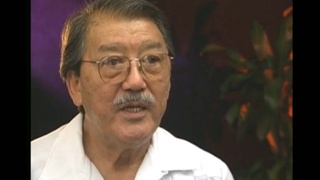Interviews
Redress payments to Issei who did not enter camps
Do you remember this man, an Issei man, who was apparently living in Utah so he was never in the camps but he applied for redress?
And just by sheer coincidence, Mary Furutani, who worked at the Gardena Seinan Senior Citizen Program or Ken Nakaoka Center—she was working with Issei—this man went to Mary and said, “You know, I applied for redress but they turned me down because I was not in the camps.” Well, I said, “Gee, you know it was very easy to find the name of anybody who was in the camps because there is a written record.”
And by sheer coincidence, just about that same week it was, Jack and I were in the Archives in Suitland, Maryland at that time, and I came across a three-by-five list of cards of Issei men who were picked up by the FBI who were not in the Western Defense Command zone, and I came across this guy’s name. He was arrested in Bingham [City], Utah, for being Japanese, and put in a jail in Salt Lake City, [Utah] and kept there, I think, about two months, then released because they had nothing on him. They couldn’t keep him, but he never went into camp. But here was this man who was arrested for no other reason except [that] he was nihonjin [Japanese] and kept incarcerated for two months.
So he was deprived of his liberty, which came under one of the provisions of the Civil Liberties Act, that if you were deprived of liberty by some action of the government, you are allowed redress. That was very simple, but it was by sheer luck that I happened to come across this one little card that had his name with a short history [of his arrest].
Date: August 26, 1998
Location: Virginia, US
Interviewer: Darcie Iki, Mitchell Maki
Contributed by: Watase Media Arts Center, Japanese American National Museum





